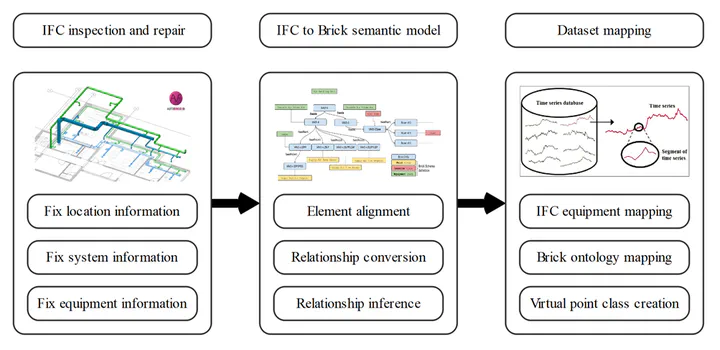Developing an Automatic Integration Approach to Generate Brick Model from Imperfect Building Information Modelling
Jan 1, 2024· ,,,,,·
0 min read
,,,,,·
0 min read
Mingchen Li
Zhe Wang
Gabe Fierro
Chi Hou Cecil Man
Pok Man Patrick So
Kin Fung Calvin Leung
 Image credit:
Image credit:Abstract
Recent advanced architectural algorithms, such as real-time optimization control and fault diagnostics, have garnered significant interest for their ability to reduce building energy consumption and improve equipment maintenance efficiency. However, deploying these algorithms in actual buildings often involves significant manual effort and time to align building data points with algorithmic requirements. In response, standardized ontologies like the Brick Schema have been introduced. This ontology streamlines the representation of building topology, equipment, and data points, as well as algorithm inputs, enabling quicker algorithm integration and deployment. Despite these advancements, manually constructing Brick models from scratch remains time-consuming, laborious, and prone to errors, presenting a new challenge in rapid model development. To overcome these issues, some researchers have turned to universal BIM formats, such as IFC/Revit, for accelerated Brick modeling. Nevertheless, the prevalence of errors in human-generated BIM models often impedes effective conversion. To efficiently convert imperfect IFC models into Brick models, this paper presents a novel BIM to Brick methodology comprising three key steps: IFC inspection and repair, IFC to Brick semantic modeling, and dataset mapping. This method ensures high-quality reuse of even imperfect IFC models. Our case study demonstrates that this method can produce an ideal Brick model from a flawed BIM model, meeting the semantic metadata requirements specified by the BuildingMOTIF tool. This innovative approach substantially reduces the effort required to generate Brick models, effectively handling the inaccuracies and noise inherent in real-world BIM.
Type
Publication
Journal of Building Engineering